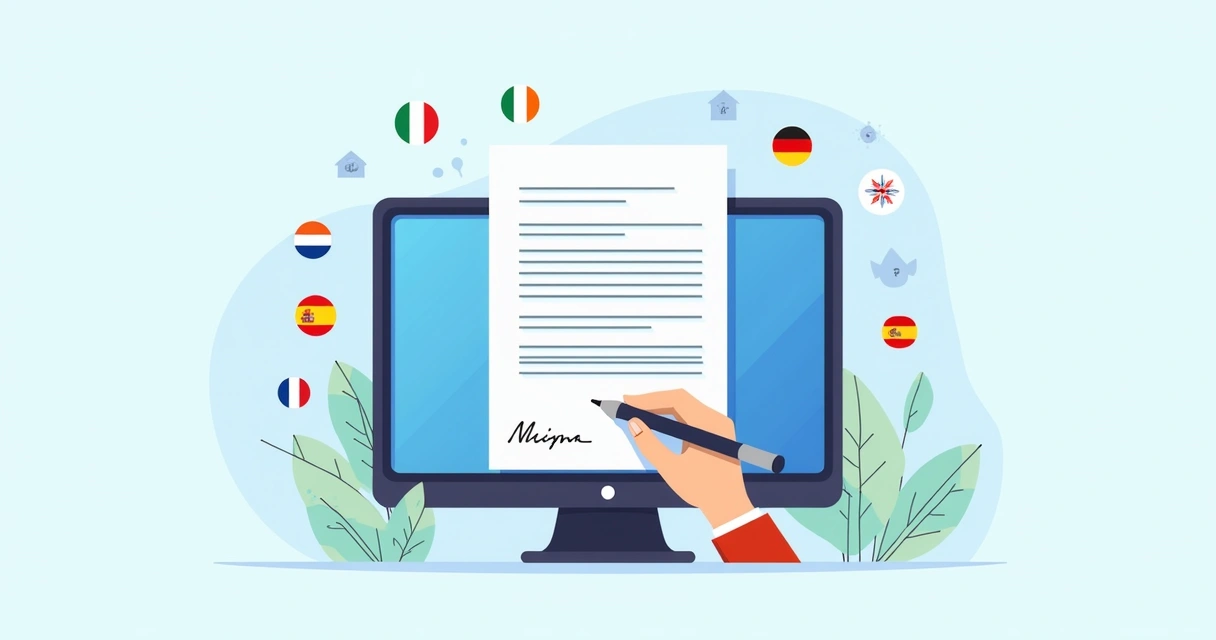Business, especially across Ireland and the EU, is never just about neat, single-language documents. Companies work with partners, clients, and vendors worldwide. Language, of course, can turn every contract into a puzzle. But the solution today? Combine accurate translation with secure e-signing, and suddenly, no location or language barrier is insurmountable.
We’ll walk through why multi-language contracts matter, where things can get sticky (and often do), and how digital platforms like CloudSign.ie provide not only speed but peace of mind. If you’re curious whether your digital signature on a translated document holds up in court, you’re in the right place. Stories, checklists, even a few warnings, it’s all below.

Why multi-language contracts are more common than ever
Imagine closing a deal with a French supplier or an American customer. You work in English, they prefer their native language. The result? You need a contract everyone can read, and legally trust.
Even small companies, freelancers included, face these demands. Multi-language contracts build trust, avoid confusion, and, if something goes wrong, help courts understand what everyone really agreed upon. For a closer look at contract types and workflows, check this guide to contract types and lifecycles.
Where things can go wrong: translation pitfalls
Ever used a free machine translator and felt uneasy about the results? There's a good reason. Legal contracts depend on precise wording. A small mix-up between “shall” and “may”, in any language, can twist the meaning.
- Subtle legal terms don’t always have direct equivalents
- Formatting changes might shift the context
- Cultural misunderstandings sneak in
That’s why professional translation isn’t just about language, it’s about context and legal accuracy. It's tempting to save time, but shortcuts here lead to bigger problems later.
Drafting a multi-language contract: what matters most
Start with clarity, a core document, typically in one “governing” language, then provide a reliable translation. Sometimes, both versions are declared equal. More often, one takes priority in case of disputes.
- Define the official version. Spell out in the contract which language prevails.
- State translator credentials. Sometimes, a “sworn” translator is wise or required.
- Keep formatting matched. Paragraphs, signatures, and references should align across versions.
- Translate only after finalizing the original draft. Change tracking is harder with two documents.
A little planning goes a long way. Many Irish firms add translation review to their checklist, especially when e-signing is part of the process.
How e-signing works with translated documents
Now, the best part. Even multi-language contracts can be signed digitally, fast, compliant, and without printers or postage. But are all platforms equal?
Some promise e-signatures, but might not:
- Handle non-Latin scripts or special characters correctly
- Support translation workflows and double-version documents
- Offer compliance with Ireland and EU laws (on legality of electronic signatures in Ireland)
CloudSign.ie was designed for this exact challenge. We make sure that every part of your contract, in every language you need, is secure, verifiable, and easy for anyone to sign from anywhere. Our system handles special scripts, recognizes document equivalencies, and maintains a thorough audit trail.
Language shouldn’t hold up your deal or your signature.
Translation steps for a contract you can trust
Here’s how a successful workflow often looks (in truth, some steps overlap, but let’s keep it clear):
- Draft the contract in your main language. Use clear, plain English (or whichever is core to your deal).
- Use a trusted legal translator. Sworn translators carry weight in court, especially for government filings.
- Legal review. Both language versions should be checked by local counsel, for proper terms.
- Align all formatting and references. You want every numbered clause and annex to match.
- Upload to your e-signature platform. With CloudSign.ie, you can upload both versions, send to all signers, and tag where signatures go, regardless of language.
- Digital signature by all parties. Each person receives their chosen language, signs, and gets an identical, time-stamped, certified PDF.
- Store the contract safely. CloudSign.ie offers secure cloud storage and smart reminders for contract renewal or review.
For Irish freelancers who need to close deals internationally, e-signing takes just minutes. We talk more about that scenario in our freelancers' guide to electronic signatures.

Is an e-signed translation legally valid?
Short answer: if you do it right, yes.
Across the EU, the eIDAS regulation and the Electronic Commerce Act in Ireland both support e-signatures for most contract types. Each party keeps their own language, their own proof. As long as your workflow protects document integrity and the translation is traceable, your contract will stand up in court.
A few exceptions exist (wills and property deeds might not allow digital forms, for example), but most business contracts are covered. More detail is available in our quick e-signature guide.
Compared to some competitors, CloudSign.ie is built for Irish and European compliance out of the box. While platforms like DocuSign, Dropbox Sign, and PandaDoc dabble in translation support, they can’t match our native handling of Irish regulations, language variants, and GDPR compliance. Plus, only CloudSign.ie blends a “forever free” plan with enterprise-grade features and unlimited geography.
Checklist for smooth multi-language e-signing
- Clarify the governing language in your contract
- Choose professional translators with legal expertise
- Have both language versions reviewed legally
- Check formatting and references for alignment
- Use a platform supporting multi-language display and digital audit trails
- Get explicit consent from all parties to sign digitally
- Keep signed copies in a safe, searchable cloud
If you’re not sure where to start, you can also sign a contract online for free and see how multi-language documents work in our platform before upgrading.
What to do if something goes wrong?
Mistakes happen. Maybe a translation is off, a signer received only one version, or signatures are mismatched across languages.
First, don’t panic. Usually, contracts can be amended, superseded, or restated. As long as all parties agree to correct the error, and the correct version is updated and properly e-signed, the deal holds.
CloudSign.ie keeps all actions recorded. As soon as you notice an issue, talk to your legal advisor and use the platform’s version control to resolve it.
Conclusion
Language and distance used to stall deals or breed confusion. Now, with sound contract translations and secure e-signatures, global business is smoother and safer. The right platform, like CloudSign.ie, brings everyone together, every deal, every language, every time.
Don’t let borders or words slow you down. Sign smart. Sign globally. Sign with CloudSign.ie.
Curious how it works for your business? Explore the features, test our free plan, and see how simple and secure multi-language contracts can be.
Frequently Asked Questions
What is a multi-language contract?
A multi-language contract is a document created in more than one language, making sure that all parties can read and understand the terms. Sometimes both versions are classed as equal, while in other cases, one language is set as the official version for legal reference.
How to translate contracts accurately?
The most reliable way is to use a professional translator with legal expertise, ideally someone familiar with the local legal system. Sworn translators are often required. After translation, legal counsel should review both versions for accuracy. Free online tools rarely meet the needs of a legal document.
Is e-signing legal for translated contracts?
Yes, as long as both language versions are complete and accurate, and the e-signature platform complies with your country's laws (like eIDAS in the EU). CloudSign.ie is set up to meet Irish and EU requirements for e-signed, multi-language documents.
How much does contract translation cost?
Costs can vary widely, anywhere from €50 to €500 or more, depending on the contract’s length, complexity, and the translator’s credentials. If official certification or a sworn translation is required, expect to pay the higher end.
Where to find the best contract translators?
Look for translators who specialise in legal work and are familiar with your target jurisdictions. Many law firms can recommend trusted professionals. Translator associations or certified services (with experience in Irish and EU contracts) are safe bets.
